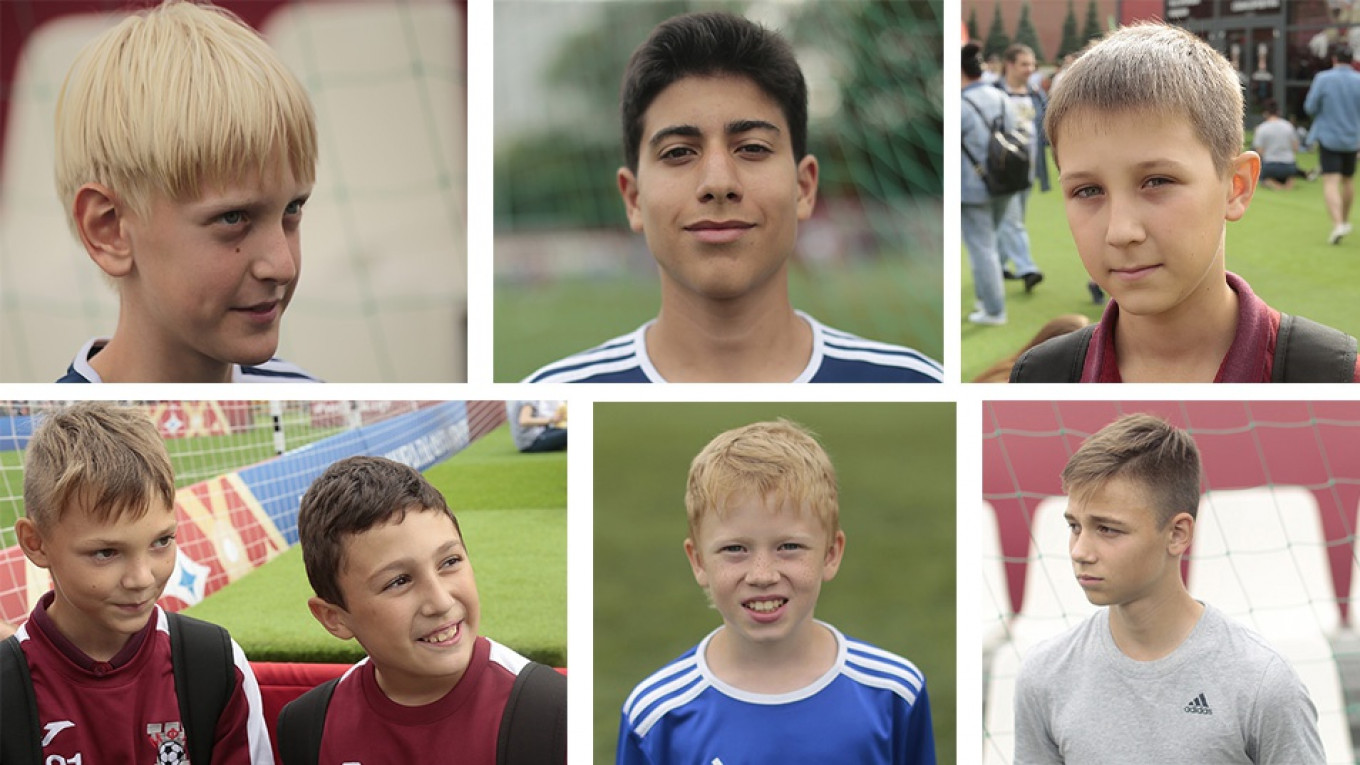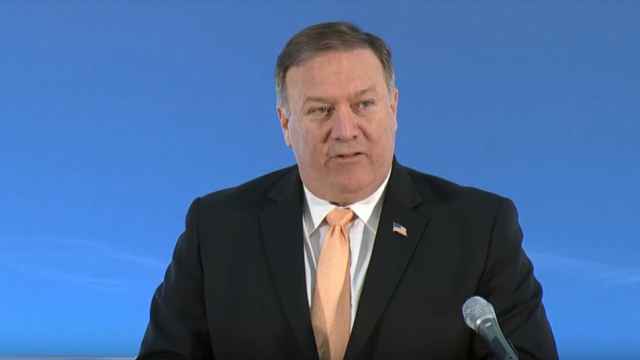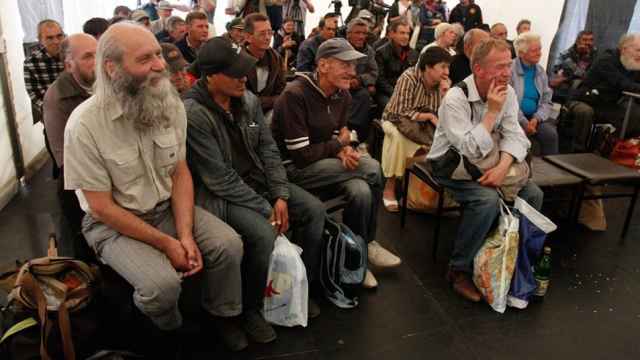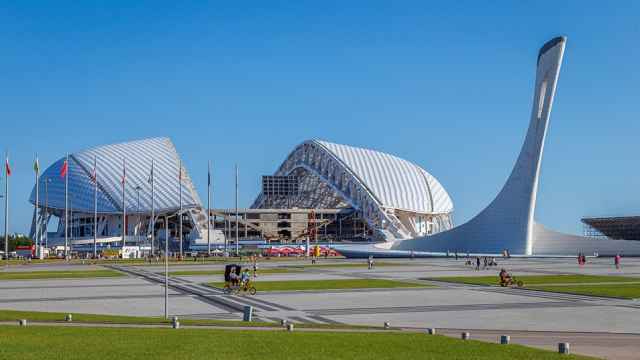The World Cup has come to an end. For most people who watched around the world, it has likely already faded into distant memory. But for a new generation of Russians who had never experienced an event of its magnitude, the tournament will have a lasting impact.
“It was my first time really watching a World Cup all the way through and getting to see Russia do so well,” said Artyom Pavlovsky, 14. “I can’t even begin to explain all the emotions I felt.”
During a water break at a summer football camp in central Moscow, five Russian national team hopefuls spoke about their favorite memories from tournament.
The home team’s performance surprised them all. Asked if they had expected Russia to not only advance out of the group stage but to get all the way to the quarterfinals for the first time in 48 years, the young footballers answered with a chorus of “no.”
Against the odds
Russia’s national team, a dark horse candidate to win the tournament, rallied an apathetic nation around it with surprise performances. As the lowest-ranked team heading into the World Cup, it sent shockwaves around the world by advancing all the way to the quarterfinals for the first time since 1970.
“I highly doubted that Russia would get out of the group. I thought they would finish third, maybe even fourth,” said Igor Chudaikin, 11. “Even after they beat Saudi Arabia, I thought, why is everyone celebrating? This is Saudi Arabia, after all.”
But then Russia beat Egypt too, and despite a loss to Uruguay, the hosts were through to the round of 16. And this was all before the biggest surprise of all: the home side’s defeat of heavyweight Spain on penalty kicks.
“I cried after the win over Spain,” Pavlovsky said. “I have never seen Moscow so excited and happy.”
Timur Tridrikh, 12, lives next to Vorobyovy Gory, the setting of the FIFA fan zone that attracted tens of thousands of spectators during the tournament to watch matches, drink and celebrate. He said he will miss being kept up late into the night by the sounds of their revelry. “It was so awesome,” he said. “I wish it could always be like that.”
More than just enjoying the festivities and Russia’s play, though, the tournament has changed the way they see their home country.
“I didn’t believe in Russia before the tournament,” said Alexander Ogloblin, 11. “Now I know you always have to believe in yourself, no matter what anyone says.”
I can do it too
That newfound belief is what 12-year-old Vadim Shiryayev, who plays for local club MFK Krepost, says will drive him to one day become a professional footballer.
“The fact that no one believed in [the team] and they were able to do something not done in so many years gives me even more motivation to become a professional,” he said. “If they could do it, then we can too.”
I can’t describe how I’m feeling. I am so driven to play for Russia
Shiryayev, two of his teammates and their coach were standing next to a football field set up at Red Square, where fans have been playing scrimmages and local clubs competed in a tournament. MFK Krepost came in third place. But even better was getting a taste of what it’s like to play in front of foreign fans.
“One day I want to play in front of even more foreign fans in a big stadium,” Shiryayev said. “I will always remember this experience. Some were even rooting for us.”
Getting noticed
It wasn’t just academy players who got to experience something beyond their ordinary schedules. In May, 18 Russian orphans participated in the Street Child World Cup, a week-long football tournament held for abandoned children from around the world in the FIFA World Cup host country.
For players who usually train on a “vegetable patch,” as one of the coaches put it, getting to play on professionally-maintained fields in the capital was life-changing.
“I can’t describe how I’m feeling. I am so driven to play for Russia,” said Valery Bombin, 15, who aspires to one day play for Russia at the World Cup. “We want to win so that we get noticed. That would mean something to us.”
For Vadim Vize, the deputy director of the Moscow Football Federation’s Beskov Center for preparing youth coaches, the World Cup atmosphere and the home team’s performance will be a big boost to Russian youth football.
“There was a point when no one could run the mile in under four minutes,” Vize said. “The record seemed impossible. But once the first person was able to do it, a whole bunch of people followed. The same effect will be seen here. As soon as the national team creates a norm, the next generation tries to surpass it. They will play with stronger belief in themselves.”
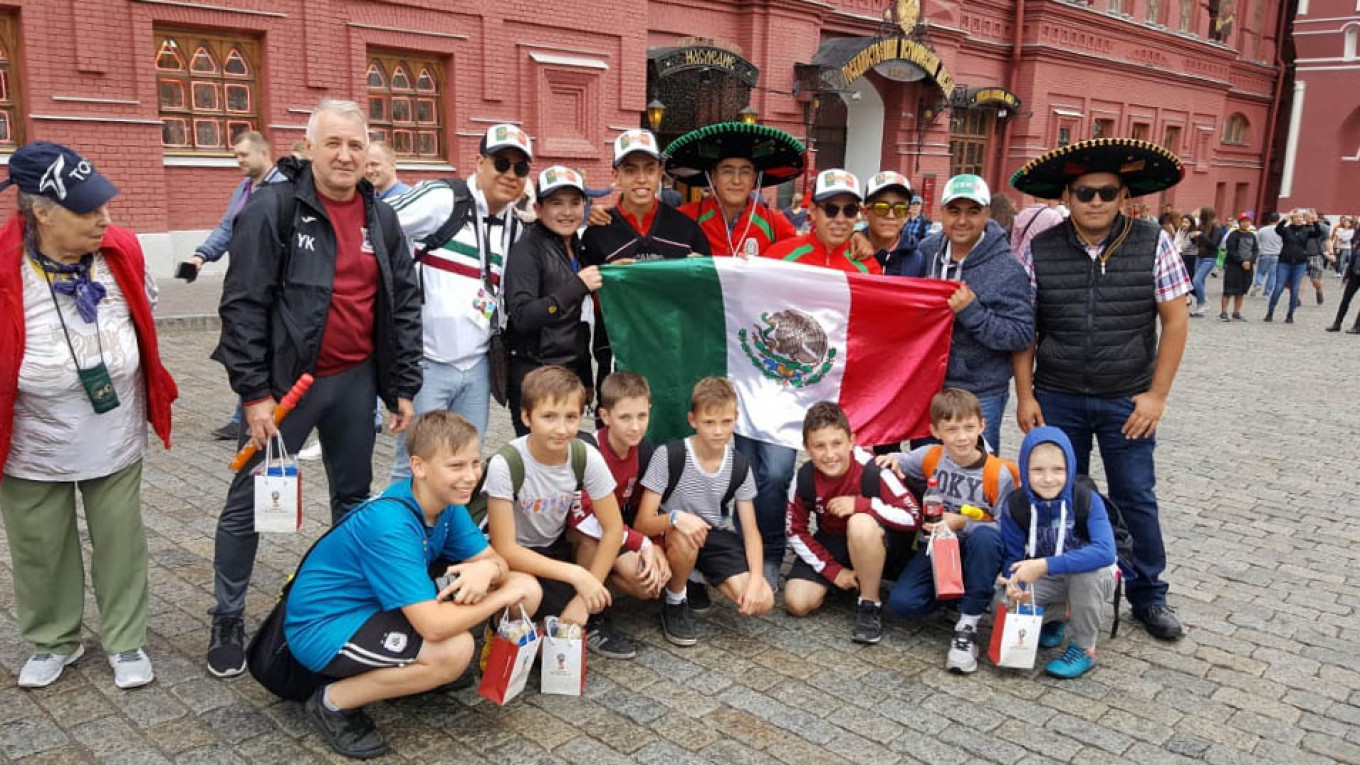
“People who had doubts about football will have seen this incredible atmosphere in the host cities and the uniting power of the game,” Vize said. “They will have seen how many people from different countries came to Moscow and how wonderful that was for everyone.”
For the children who spoke with The Moscow Times, foreign visitors were, ultimately, their favorite part of the entire experience.
Ten-year-old Stepan Surikov of MFK Krepost boasted of selfies with Mexican fans. Summer camper Pavlovsky said his favorite part was helping tourists — including Brazilians and Mexicans — with directions. Fellow camper Tridrikh said his favorite part of the experience was a celebration of the Mexican holiday the Day of the Dead on Red Square. “I loved the makeup and the dancing the most,” he said.
And Chudaikin, another camper, said he wished the World Cup would be held every year so he could always “talk to so many foreigners.”
“So many people from so many different countries came here and spoke so many different languages,” Chudaikin continued, excitedly. “And I just think that was so nice.”
For most of the Russian children who played in the Street Child World Cup tournament in Moscow, it was the first time they had met foreigners.
During a match between Uzbekistan and Pakistan, Alexei Bogdanov inched his way closer to the girls from the U.S. team who were seated on the bleachers overlooking the field. He started a conversation with the girl closest to him. Later, they shared their contact details and took selfies together.
“The best memory is how many new friends I made,” Bogdanov said. “I made friends with the kids from Egypt, the U.S., Kazakhstan. I know a little bit of English and I also use a translator app.”
Shedding stereotypes
The children were also proud of how Russia had treated their foreign guests.
“I really love how welcoming my country was to all of these different people,” said Eduard Movsisyan, a 15-year-old camper. “They also did a lot of reconstruction to make it nice for them.”
Ahead of the World Cup, Moscow embarked on citywide renovations and restorations to prepare for the large influx of tourists. (It didn’t hurt that mayoral elections will fall in September following the tournament.)
The renovations — among the children, at least — have been a hit.
“I came from Tomsk for this summer camp,” said Ogloblin, referring to a university town in Siberia. “The last time I was here was when I was six. And it looks so much better and cleaner now.”
“It has changed so much and definitely for the better,” said Tridrikh. “It’s better, cleaner and so much prettier.”
But the main takeaway for Chudaikin is that, before the tournament, he had heard that foreign media were presenting Russia as a “mean, unwelcoming place.”
“Look how many foreigners came here and everything was the opposite of what people thought would happen,” he said.
“People always talk about Russia in stereotypes. But why do that? Hopefully the World Cup showed that we’re not like this.”
Lena Smirnova contributed reporting
A Message from The Moscow Times:
Dear readers,
We are facing unprecedented challenges. Russia's Prosecutor General's Office has designated The Moscow Times as an "undesirable" organization, criminalizing our work and putting our staff at risk of prosecution. This follows our earlier unjust labeling as a "foreign agent."
These actions are direct attempts to silence independent journalism in Russia. The authorities claim our work "discredits the decisions of the Russian leadership." We see things differently: we strive to provide accurate, unbiased reporting on Russia.
We, the journalists of The Moscow Times, refuse to be silenced. But to continue our work, we need your help.
Your support, no matter how small, makes a world of difference. If you can, please support us monthly starting from just $2. It's quick to set up, and every contribution makes a significant impact.
By supporting The Moscow Times, you're defending open, independent journalism in the face of repression. Thank you for standing with us.
Remind me later.



